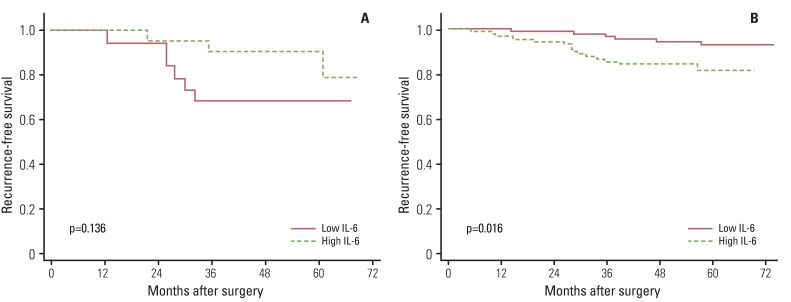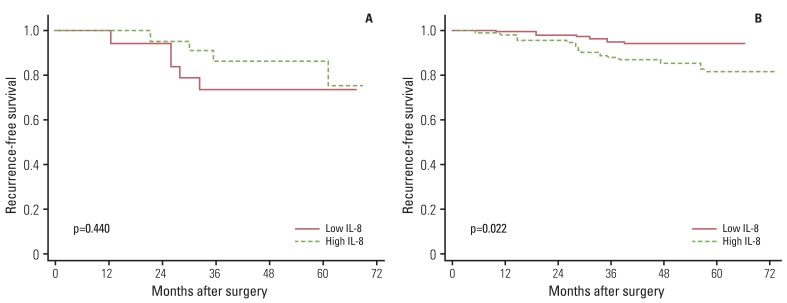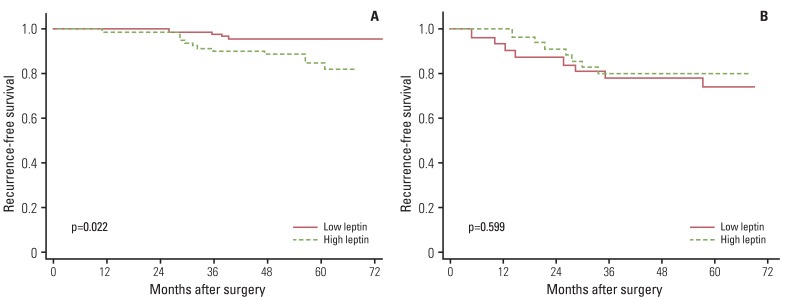Cancer Res Treat.
2013 Sep;45(3):210-219.
Prognostic Role of Interleukin-6, Interleukin-8, and Leptin Levels According to Breast Cancer Subtype
- Affiliations
-
- 1Molecular Epidemiology Branch, National Cancer Center, Goyang, Korea. jskim@ncc.re.kr
- 2Department of Food and Nutrition, Sookmyung Women's University, Seoul, Korea.
- 3Center for Breast Cancer, National Cancer Center, Goyang, Korea.
Abstract
- PURPOSE
Inflammation within the tumor microenvironment has been reported to show an association with poor prognosis in breast cancer. However, the associations may differ according to breast cancer subtype. In this study, we investigated the association between inflammation-related markers and breast cancer recurrence according to patients' tumor subtypes.
MATERIALS AND METHODS
This prospective study included 240 patients who underwent surgery for management of newly diagnosed breast cancer. Levels of inflammation-related markers (interleukin [IL]-1beta, IL-6, IL-8, monocyte chemoattractant protein-1 [MCP-1], leptin, and adiponectin) were measured at diagnosis, and the associations between these markers and breast cancer recurrence during a six-year follow-up period were examined using the Kaplan-Meier statistical method.
RESULTS
Overall, inflammation-related markers showed no association with breast cancer recurrence. However, when data were stratified by tumor subtype, higher levels of some mediators showed an association with poor prognosis among patients with particular subtypes. Compared to patients without recurrence, patients with recurrence had higher levels of circulating IL-6 (p=0.024) and IL-8 (p=0.016) only among those with HER2- tumors and had higher levels of leptin (p=0.034) only among those with estrogen receptor (ER)+/progesterone receptor (PR)+ tumors. Results of survival analyses revealed an association of high levels of IL-6 (p=0.016) and IL-8 (p=0.022) with poor recurrence-free survival in patients with HER2- tumors. In addition, higher leptin levels indicated shorter recurrence-free survival time only among patients with ER+/PR+ tumors (p=0.022).
CONCLUSION
We found that certain cytokines could have a differential prognostic impact on breast cancer recurrence according to breast cancer subtype. Conduct of additional large studies will be required in order to elucidate the precise roles of these cytokines in breast cancer progression.
MeSH Terms
-
Breast
Breast Neoplasms
Chemokine CCL2
Cytokines
Estrogens
Follow-Up Studies
Humans
Inflammation
Interleukin-6
Interleukin-8
Leptin
Prognosis
Prospective Studies
Receptors, Estrogen
Receptors, Progesterone
Recurrence
Tumor Microenvironment
Chemokine CCL2
Cytokines
Estrogens
Interleukin-6
Interleukin-8
Leptin
Receptors, Estrogen
Receptors, Progesterone
Figure
Reference
-
1. Goldberg JE, Schwertfeger KL. Proinflammatory cytokines in breast cancer: mechanisms of action and potential targets for therapeutics. Curr Drug Targets. 2010; 11:1133–1146. PMID: 20545607.2. Gilbert CA, Slingerland JM. Cytokines, obesity, and cancer: new insights on mechanisms linking obesity to cancer risk and progression. Annu Rev Med. 2013; 64:45–57. PMID: 23121183.
Article3. Nicolini A, Carpi A, Rossi G. Cytokines in breast cancer. Cytokine Growth Factor Rev. 2006; 17:325–337. PMID: 16931107.
Article4. Seruga B, Zhang H, Bernstein LJ, Tannock IF. Cytokines and their relationship to the symptoms and outcome of cancer. Nat Rev Cancer. 2008; 8:887–899. PMID: 18846100.
Article5. Onitilo AA, Engel JM, Greenlee RT, Mukesh BN. Breast cancer subtypes based on ER/PR and Her2 expression: comparison of clinicopathologic features and survival. Clin Med Res. 2009; 7:4–13. PMID: 19574486.
Article6. Gonzalez RM, Daly DS, Tan R, Marks JR, Zangar RC. Plasma biomarker profiles differ depending on breast cancer subtype but RANTES is consistently increased. Cancer Epidemiol Biomarkers Prev. 2011; 20:1543–1551. PMID: 21586622.
Article7. Levano KS, Jung EH, Kenny PA. Breast cancer subtypes express distinct receptor repertoires for tumor-associated macrophage derived cytokines. Biochem Biophys Res Commun. 2011; 411:107–110. PMID: 21712030.
Article8. McShane LM, Altman DG, Sauerbrei W, Taube SE, Gion M, Clark GM, et al. Reporting recommendations for tumor marker prognostic studies. J Clin Oncol. 2005; 23:9067–9072. PMID: 16172462.
Article9. Regitnig P, Reiner A, Dinges HP, Hofler G, Muller-Holzner E, Lax SF, et al. Quality assurance for detection of estrogen and progesterone receptors by immunohistochemistry in Austrian pathology laboratories. Virchows Arch. 2002; 441:328–334. PMID: 12404057.
Article10. Jacobs TW, Gown AM, Yaziji H, Barnes MJ, Schnitt SJ. Specificity of HercepTest in determining HER-2/neu status of breast cancers using the United States Food and Drug Administration-approved scoring system. J Clin Oncol. 1999; 17:1983–1987. PMID: 10561248.
Article11. Nam BH, Kim SY, Han HS, Kwon Y, Lee KS, Kim TH, et al. Breast cancer subtypes and survival in patients with brain metastases. Breast Cancer Res. 2008; 10:R20. PMID: 18307763.
Article12. Yerushalmi R, Woods R, Ravdin PM, Hayes MM, Gelmon KA. Ki67 in breast cancer: prognostic and predictive potential. Lancet Oncol. 2010; 11:174–183. PMID: 20152769.
Article13. Edge SB, Byrd DR, Compton CC, Fritz AG, Greene FL, Trotti A, editors. AJCC cancer staging manual. 7th ed. New York: Springer;2010. p. 347–376.14. Henson DE, Ries L, Freedman LS, Carriaga M. Relationship among outcome, stage of disease, and histologic grade for 22,616 cases of breast cancer The basis for a prognostic index. Cancer. 1991; 68:2142–2149. PMID: 1913453.
Article15. Cole SW. Chronic inflammation and breast cancer recurrence. J Clin Oncol. 2009; 27:3418–3419. PMID: 19470918.
Article16. Salgado R, Junius S, Benoy I, Van Dam P, Vermeulen P, Van Marck E, et al. Circulating interleukin-6 predicts survival in patients with metastatic breast cancer. Int J Cancer. 2003; 103:642–646. PMID: 12494472.
Article17. Bachelot T, Ray-Coquard I, Menetrier-Caux C, Rastkha M, Duc A, Blay JY. Prognostic value of serum levels of interleukin 6 and of serum and plasma levels of vascular endothelial growth factor in hormone-refractory metastatic breast cancer patients. Br J Cancer. 2003; 88:1721–1726. PMID: 12771987.
Article18. Benoy IH, Salgado R, Van Dam P, Geboers K, Van Marck E, Scharpe S, et al. Increased serum interleukin-8 in patients with early and metastatic breast cancer correlates with early dissemination and survival. Clin Cancer Res. 2004; 10:7157–7162. PMID: 15534087.
Article19. Muraro E, Martorelli D, Turchet E, Miolo G, Scalone S, Comaro E, et al. A different immunologic profile characterizes patients with HER-2-overexpressing and HER-2-negative locally advanced breast cancer: implications for immune-based therapies. Breast Cancer Res. 2011; 13:R117. PMID: 22112244.
Article20. Ciampricotti M, Vrijland K, Hau CS, Pemovska T, Doornebal CW, Speksnijder EN, et al. Development of metastatic HER2(+) breast cancer is independent of the adaptive immune system. J Pathol. 2011; 224:56–66. PMID: 21480230.
Article21. Barone I, Catalano S, Gelsomino L, Marsico S, Giordano C, Panza S, et al. Leptin mediates tumor-stromal interactions that promote the invasive growth of breast cancer cells. Cancer Res. 2012; 72:1416–1427. PMID: 22282662.
Article22. Catalano S, Marsico S, Giordano C, Mauro L, Rizza P, Panno ML, et al. Leptin enhances, via AP-1, expression of aromatase in the MCF-7 cell line. J Biol Chem. 2003; 278:28668–28676. PMID: 12734209.
Article23. Catalano S, Mauro L, Marsico S, Giordano C, Rizza P, Rago V, et al. Leptin induces, via ERK1/ERK2 signal, functional activation of estrogen receptor alpha in MCF-7 cells. J Biol Chem. 2004; 279:19908–19915. PMID: 14985328.
- Full Text Links
- Actions
-
Cited
- CITED
-
- Close
- Share
- Similar articles
-
- The role of interleukin-6 and interleukin-10 in human pulpal inflammation
- Leptin and Leptin Receptor Expression in Breast Cancer
- Effects of B-16 Melanoma Cells and Mycoplasma pneumoniae on the Induction of IL-1 beta, IL-2, IL-6, IL-10, IL-12, and TNF - alpha from Mouse Astrocytes
- Induction of IL-6 and IL-8 Expression by Leptin Treatment in Periodontal Ligament Cells and Gingival Fibroblasts
- The soluble interleukin 2 receptor levels in Kawasaki disease




